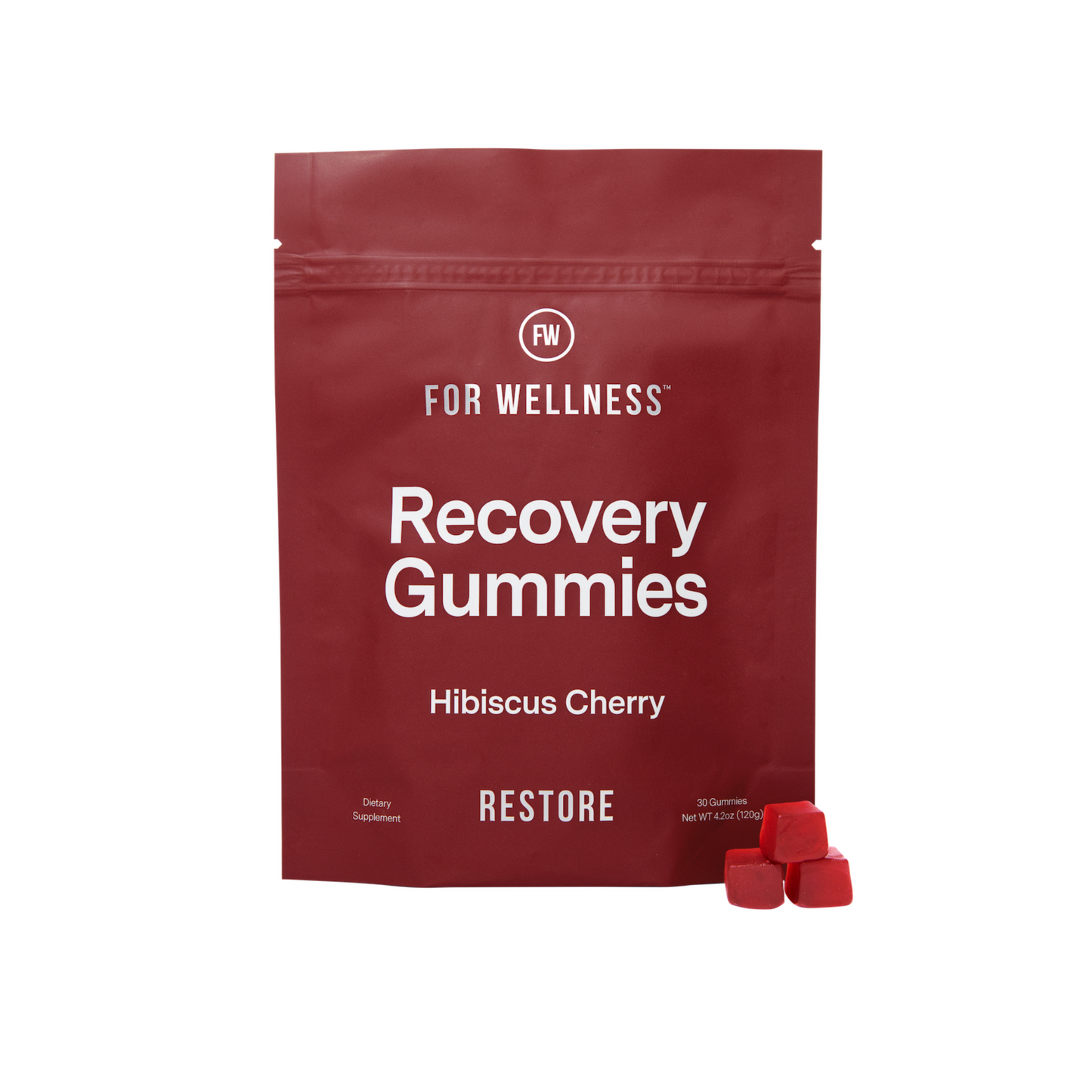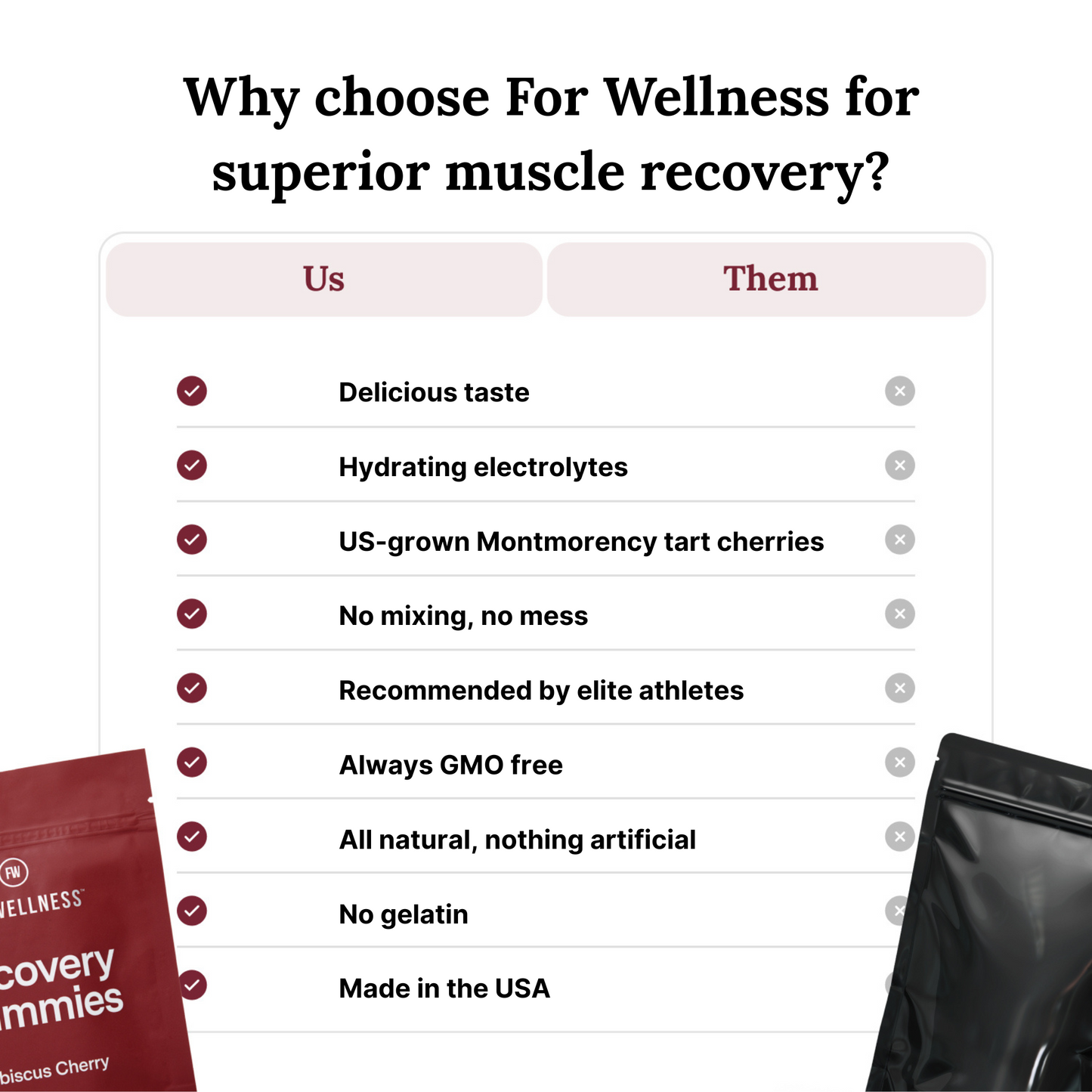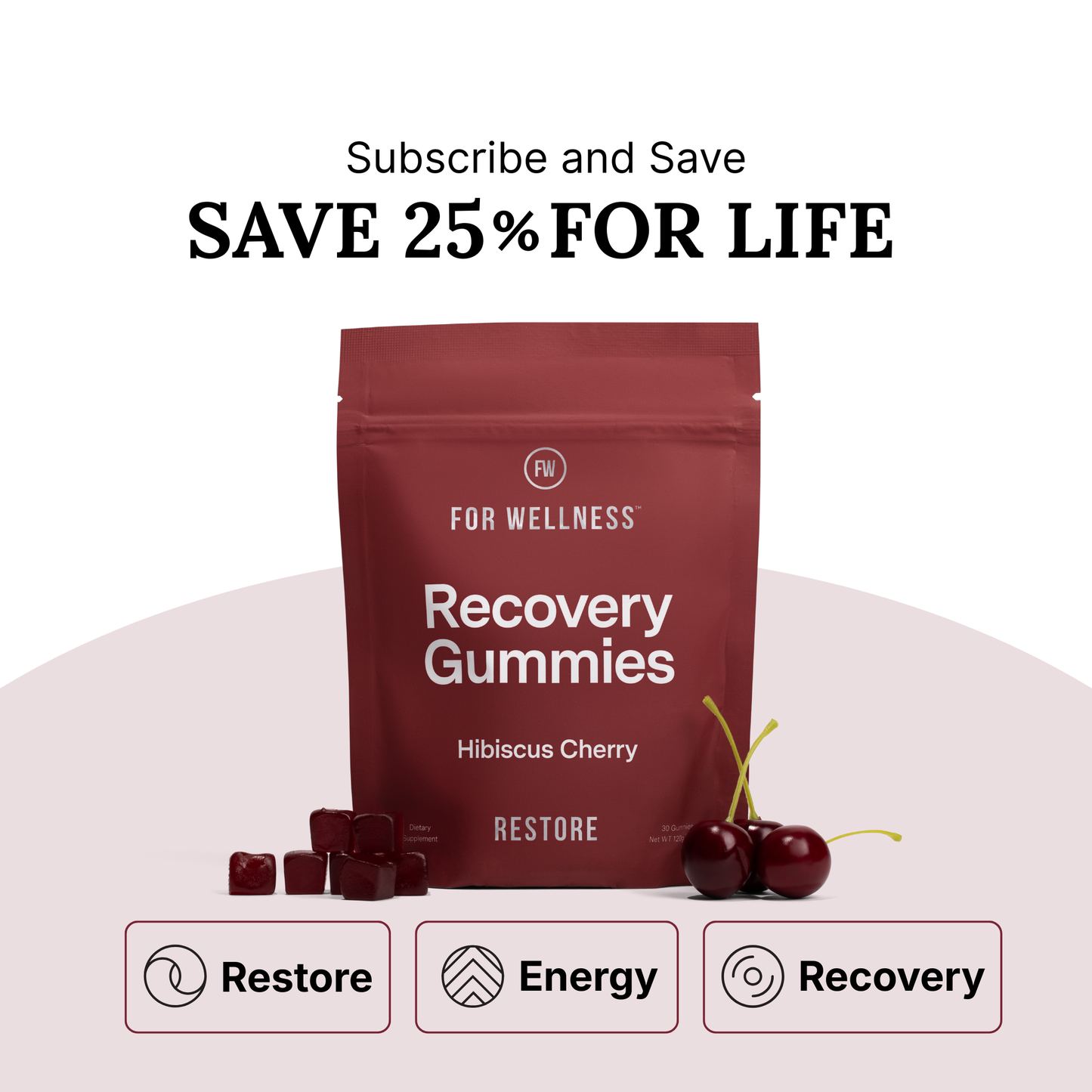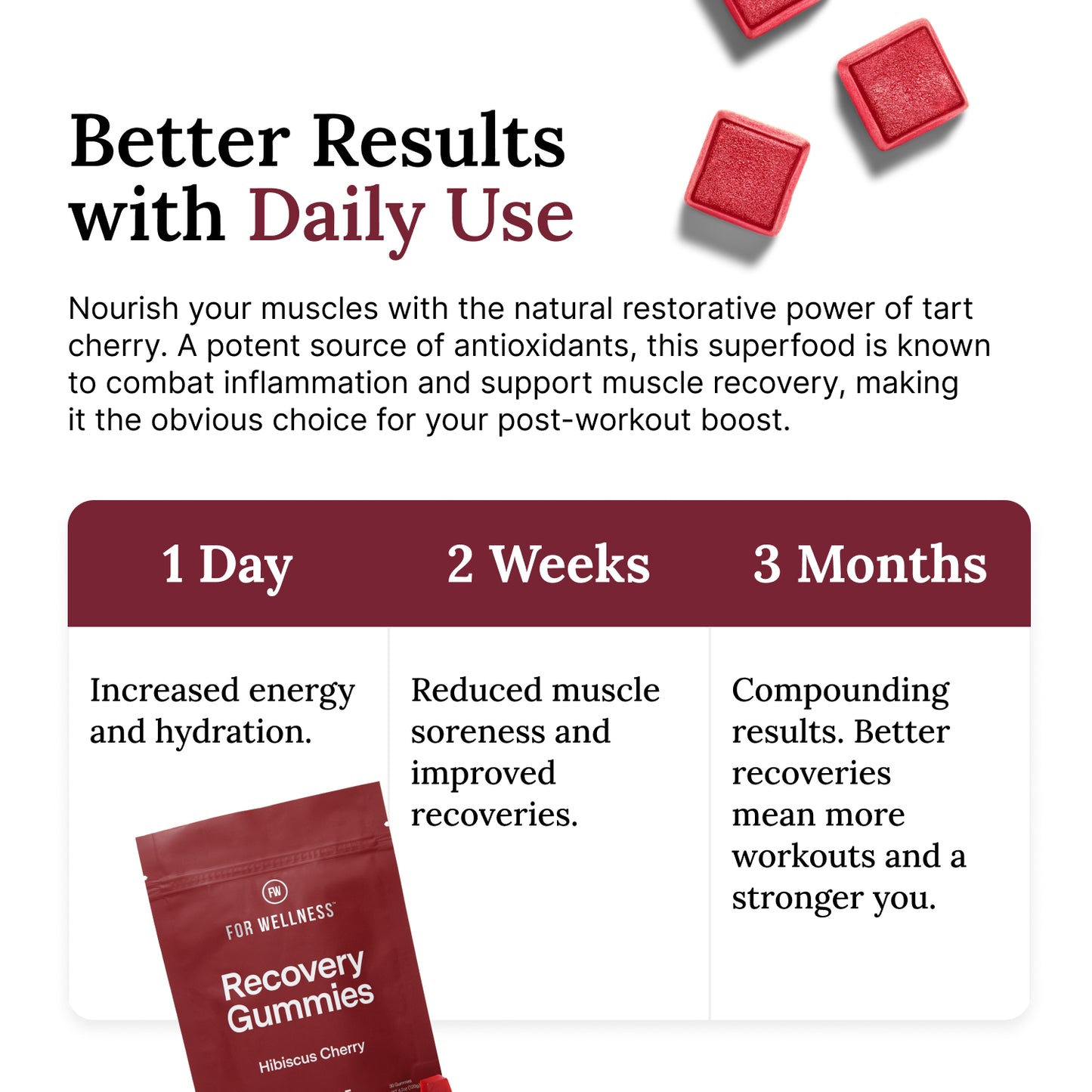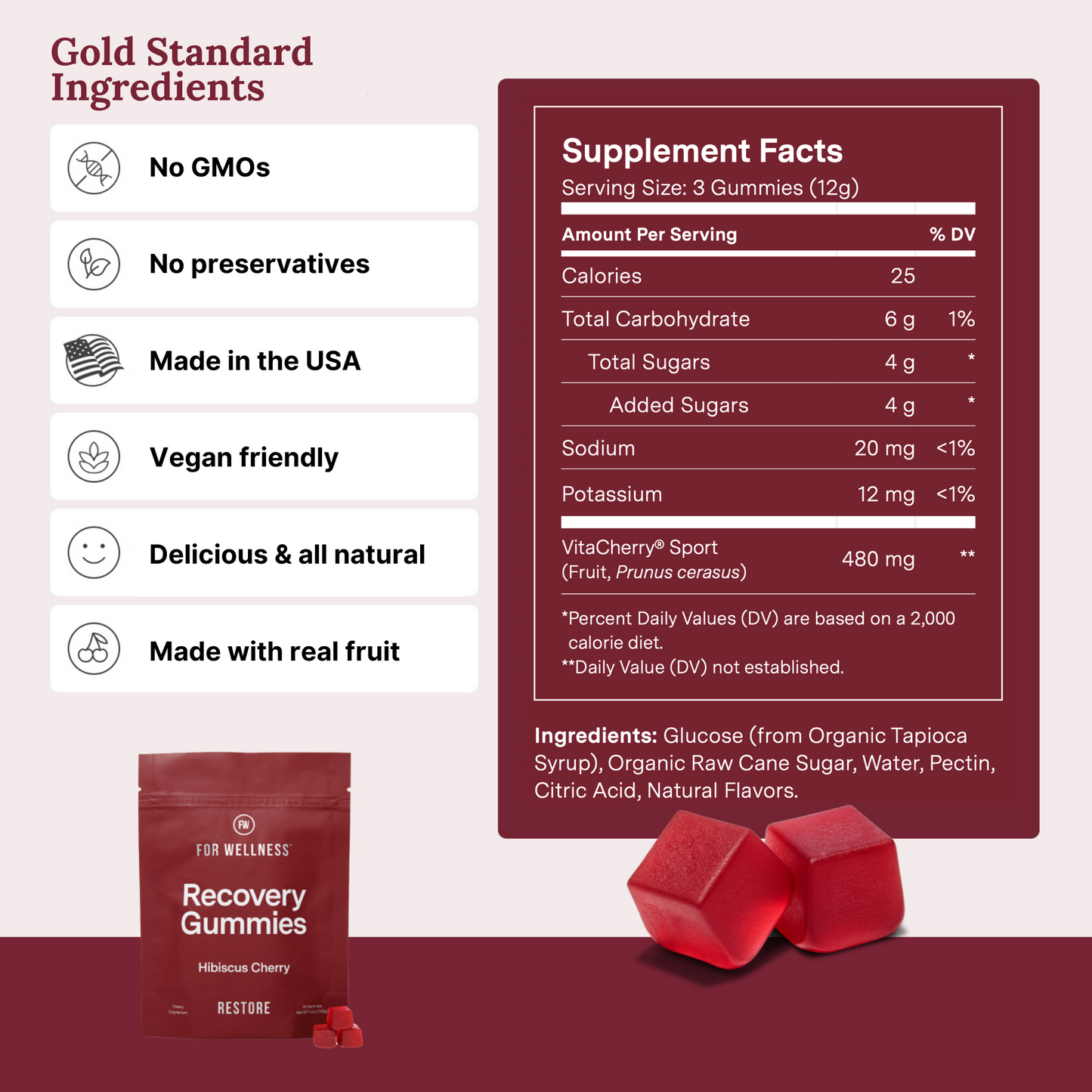We all know the importance of a balanced diet and strategic supplementation for peak performance and that overall feeling of ✨ awesomeness ✨. That’s why we meticulously track our macros, avoid junk food, and wouldn’t dream of skipping our daily dose of vitamin D.
But can you say the same about getting enough magnesium? This multitasking mineral is a true MVP for your health and wellness. Yet since it’s not typically listed on nutrition labels like sodium or calcium, nearly half of Americans aren’t hitting their daily intake goal.
Overlooking this nutrient superstar ends today! We’re diving into the science-backed benefits of magnesium to prove why adding a little more of this under-the-radar electrolyte upgrades your entire life.


Recovery Gummies - Hydrate
-
Full of antioxidants and replenishes electrolytes.
-
Boosts energy with all-natural ingredients.
-
Tastes incredible with juicy blueberry flavors.
So, What is Magnesium?
Magnesium is the fourth most abundant mineral in your body, and it’s involved in ~800 different biochemical reactions. Your brain and literally every organ in your body needs magnesium. According to the National Institutes of Health’s Office of Dietary Supplements (NIH ODS), magnesium supports:
- Muscle function and nerve impulses
- Blood pressure and normal heart rhythms
- Protein creation from amino acids to build and repair muscles
- Joint and bone health to prevent osteoporosis
- Cognitive functions like learning and memory
- Immunity
- Respiratory health
The role of magnesium is so vital that it’s been classified as an essential mineral.
How Much Magnesium Do You Need Each Day?
The recommended dietary allowance (RDA) for magnesium varies depending on age, sex, and overall health. Experts recommend 400–420 milligrams (mg) of magnesium for men and 310–360 mg of magnesium for women daily. But there’s evidence that our ancestors may have had dietary reference intakes closer to 600 mg per day!
Many researchers now believe these recommendations should be considered a baseline and encourage us to aim higher. Low levels of magnesium have been linked to several chronic health conditions, such as Alzheimer’s disease, insulin resistance, type-2 diabetes, hypertension (high blood pressure), cardiovascular disease, cancer, and more.
Signs You’re Not Getting Enough Magnesium
When healthy people are low in magnesium, their kidneys kick into retention mode to limit the amount of magnesium lost via urine. But chronically low magnesium levels can manifest as symptoms like:
- Fatigue/tiredness
- Muscle cramps and spasms
- Irritability, anxiety, and depression
- Insomnia and other sleep issues
- Irregular heartbeat
- Numbness and tingling
- Migraine headaches
- Brain fog and slower thinking
Our bodies absorb less magnesium as we age, explaining why older adults are at a higher risk of magnesium deficiency. The same goes for anyone taking diuretics and those with gastrointestinal diseases (Crohn’s, Celiac, IBS, etc.), type 2 diabetes, and kidney disease.
However, since magnesium is lost through sweat, active people, those with physically demanding jobs, and people living in hot and humid environments also require more magnesium. Luckily, the perks of boosting your intake levels are totally worth it.
7 Magnificent Health Benefits of Magnesium
Achieving your dietary magnesium goal may help you:
1. Increase Energy Levels 🚀
Magnesium supports the enzymes that convert food into ATP — the energy currency your muscles rely on to perform at their peak. Magnesium also helps glucose enter your cells, so you have a rapid fuel source on deck. This perk also translates to greater insulin sensitivity, which means fewer blood sugar spikes and energy-zapping crashes.
2. Improve Your Electrolyte Balance ⚖️
Magnesium is a mineral and electrolyte, like sodium, potassium, calcium, and phosphorus. Maintaining proper electrolyte balance with magnesium does more than prevent dehydration—it ensures optimal muscle function and delays the onset of muscle fatigue.
That’s why replenishing your water and electrolytes during workouts helps you stay hydrated, boosts endurance, and unleashes your inner champion.
3. Enhance Muscle Function and Recovery 💪
Magnesium is crucial for muscle contraction and relaxation. But, if you’re low on magnesium, your muscles will contract too much, leading to painful cramps, spasms, and aches and pains that take you out of the game.
A systematic review of 10 studies revealed that using magnesium ignited muscle power, torque, exercise performance, hand grip strength, and lean body mass. Plus, it significantly reduced muscle soreness and markers of muscle damage.
So even though tart cherry may be your muscles’ ultimate post-workout recovery buddy, magnesium makes an ideal tag team partner. It can help reduce perceived exertion and raise feelings of recovery to combat muscle soreness naturally.
4. Support Heart Health ❤️
Magnesium offers several benefits for a healthy ticker. It can improve cholesterol profiles, decrease blood pressure, enhance blood flow, and lower several major risk factors for heart disease. Since cardiovascular diseases are a leading cause of death globally, this is a major win for your longevity.
5. Prevent and Treat Migraine Headaches ⚡
Researchers say people who frequently suffer from migraines often have significantly low serum magnesium levels (magnesium in your blood). However, studies show that magnesium supplementation may be just as effective as traditionally prescribed migraine medications to prevent and treat them.
6. Reduce Stress and Depression 🧘
Scientists say magnesium and stress create a “vicious circle.” Low magnesium increases our susceptibility to stress. Then, when we’re at our lowest, our bodies demand more magnesium, further depleting our tanks and worsening how we feel.
That’s why upping your magnesium intake is one of the best tips to manage stress.
Magnesium is a natural relaxant. Get more of it, and magnesium can help produce calming neurotransmitters like GABA and serotonin while keeping stress hormones like cortisol in check. This explains why magnesium supplementation may naturally help heal our mental health.
Read more: Bite Back at Stress with These 8 Mood-Boosting Foods!
7. Encourage Better Sleep 😴
A solid night’s sleep is essential for athletic performance, recovery, focus, and overall well-being. But if you’ve been slacking in the magnesium department, you may be struggling with insomnia, daytime sleepiness, nighttime snoring, and other associated sleep disorders.
Low magnesium also increases your risk of painful nocturnal leg cramps (NLC) that keep you from snoozing soundly.
Now for the encouraging intel: several studies demonstrate that boosting your magnesium intake can raise melatonin levels (the hormone that regulates your sleep/wake cycle), decrease time to fall asleep, and enhance overall sleep quality while reducing nighttime awakenings. It also helps reduce the frequency, intensity, and discomfort level of NLCs.
The result? More restorative ZZZs and happier, more energized mornings.
Ready To Level Up Your Magnesium Levels?
Now that you’re wise to the positive effects of magnesium, let’s talk about how to easily up your intake:
Eat More Magnesium-Rich Foods
You’ll find magnesium in whole food sources such as green leafy vegetables (spinach, kale, and collard greens), pumpkin seeds, chia seeds, nuts (almonds, cashews, and Brazil nuts), legumes (peanuts, peas, and beans), dark chocolate, whole grain bread and cereals, avocado, and seafood.
You are less likely to overeat these foods because their magnesium content is relatively low and easily absorbed by your body. However, that also means it can be challenging to consistently meet your daily needs through diet alone, especially for athletes with higher magnesium requirements.
Consider a Magnesium Supplement
Here’s a quick rundown of the most common forms of magnesium:
- Magnesium Citrate. The most well-studied form, and the kind in our Recovery Gummies™ Hydration, magnesium citrate boasts high bioavailability. It’s an ideal choice for quickly addressing low dietary magnesium intakes.
- Magnesium Oxide. This popular and affordable option isn’t well absorbed by your body, so it’s often used as a laxative (not exactly what we’re going for here!) or an antacid for heartburn relief.
- Magnesium Chloride and Magnesium Sulfate. These forms are used in lotions, bath salts, and foot soaks to soothe sore muscles.
Seek medical advice from your healthcare provider about which form of magnesium may be suitable for you. Magnesium supplements can interact with certain antibiotics, diuretics, and proton pump inhibitor (PPI) drugs.
While it’s almost impossible to get too much magnesium from food, very high doses of magnesium from dietary supplements can lead to nausea, cramping, and diarrhea. High levels in the 5,000 mg/day range have also been associated with magnesium toxicity.
Try Our Recovery Gummies™ Hydration!🫐
Feel and perform your best with our Recovery Gummies™ Hydration — the perfect blend of essential electrolytes (potassium, sodium, and magnesium) and VitaBlue®, a 100% pure blueberry extract offering the full antioxidant power of high-quality American blueberries.
When it comes to athletic performance and recovery, magnesium citrate shines like a champion’s gold medal. It’s generally well-tolerated, and the gummy format further minimizes the risk of digestive discomfort often associated with some magnesium supplements. Plus, they're way tastier than pills!
Pop our convenient, portable pouch in your gym bag or purse, and make working on your daily magnesium and hydration goals a delicious treat!
Written by Lauren Ciccarelli, a writer and research geek passionate about low-carb nutrition, mental health, and meditation. Her 2,500+ articles empower doers with science-backed tips for leveled-up living.



